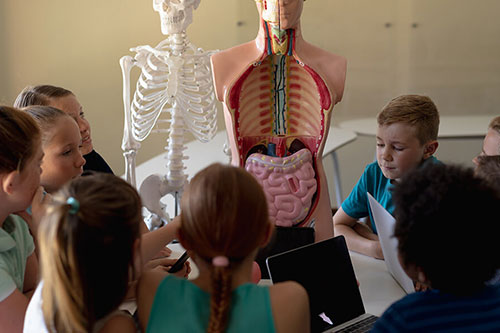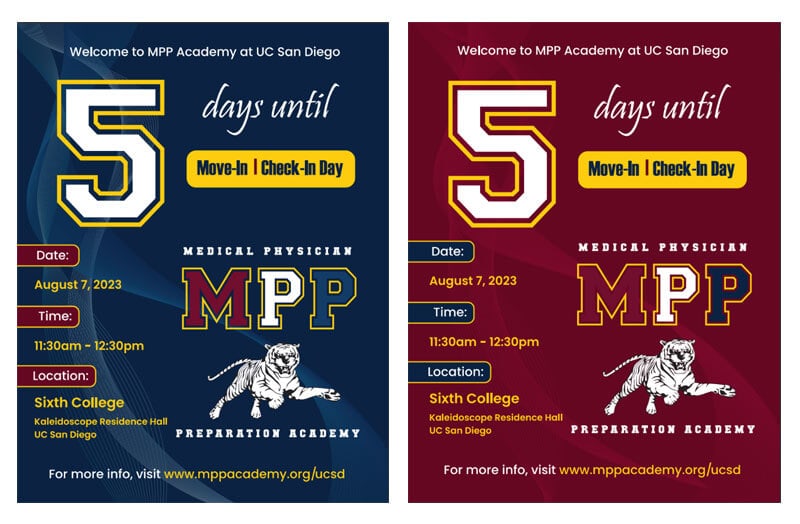This page is under construction, temporarily.
If you have questions or need assistance, please contact our main office at 800.799.4640.
Thank you,
MPP Academy
We are an early outreach "pre-med and medical/health professional school readiness" program, committed to preparing the next generation of medical doctors (MD's | DO's), health professionals (i.e., Physician Assistants, Nurses, Dentists, EMTs/Paramedics) and scientists for the physician and healthcare workforce.
We are an early outreach "pre-med and medical/health professional school readiness" program, committed to preparing the next generation of medical doctors (MD's | DO's), health professionals (i.e., physician assistants, nurses, dentists) and scientists for the physician and healthcare workforce.

We are accepting applications from current 4th and 5th grade students.
VISIT ELEMENTARY SCHOOL PROGRAM WEBSITEQuick Links:
We are accepting applications from current 6th, 7th, and 8th grade students.
VISIT MIDDLE SCHOOL PROGRAM WEBSITEQuick Links:


We are accepting applications from current 9th, 10th, 11th, and 12th grade students.
AYPWe are accepting applications from undergraduate students starting January 1, 2024.
VISIT UNDERGRADUATE PROGRAM WEBSITEQuick Links:


This page is under construction, temporarily.
If you have questions or need assistance, please contact our main office at 800.799.4640.
Thank you,
MPP Academy

OUR RESPONSE TO COVID-19 Learn More
VIRTUAL INFORMATION SESSIONS Learn More
The EMT & Paramedic Elective course and Student Interest Group is designed as a comprehensive introduction to the EMT and Paramedic profession and the practice of advanced medical skills in the pre-hospital treatment of the sick and injured. Through a variety of didactic and clinical experiences, students will grow in their understanding of the roles and responsibilities of a paramedic within the larger context of the emergency medical services (EMS) profession.
The history and development of EMS, the well-being of pre-hospital care providers, medical-legal considerations, ethics, therapeutic communications, personal and scene safety, patient assessment and other topics will be discussed.
Clinically, a strong emphasis is placed on developing an assessment-based approach to patient care that leads to timely and appropriate treatment regimens and the support and sustaining of human life. Additionally, MPP students will be provided with an in-depth understanding of the predominant medical emergencies encountered in the pre-hospital setting.
The Sports Medicine Elective and Specialty Interest Group is designed to introduce students to the field of primary care sports medicine. The diagnosis and management of musculoskeletal injuries, as well as other medical needs of athletes.
The Emergency Medicine Elective Course and Specialty Interest Group work with MPP faculty to learn clinical skills and discuss topics about Emergency Medicine, such as the day to day life of Emergency Medicine physicians, exploring career choices in Emergency Medicine, and much more.
The Dermatology Elective Course and Student Interest Group aims to expand early awareness and interest among students about the field of dermatology and dermatopathology.
The goal of the Cardiology Elective Course & Student Interest Group is to expose future physicians to the excitement of different fields within cardiology at an early stage in training. To do so, we will organize meetings with cardiologist to speak to MPP students about their work and the current trends in the field of cardiology.
Students benefit by getting early exposure to hands-on clinical skills with common procedures and techniques in cardiology, plus the privilege to meet some wonderful doctors whom they would not otherwise come in contact with so early in their training. We hope this elective course and specialty interest group will spark interest in pursuing a career path in one of the cardiology specialties to balance the growing need for cardiologists both in the clinical and research realms.
The Anesthesiology Elective Course and Student Interest Group at MPP aims to provide early awareness and interest in Anesthesiology as it is a medical specialty that medical students have very little exposure to in the preclinical and clinical years during medical school.
It provides opportunities for our pre-med students to learn about the specialty, become involved in research, mentorship, and shadowing, and acquire hands-on clinical skills with common procedures and techniques, such as an airways lab to allow students to gain experience in intubating a patient and doing a cricothyroidotomy.
I am text block.
I am text block.
I am text block.
I am text block.
I am text block.
I am text block.
I am text block.
I am text block.
I am text block.
I am text block.
I am text block.
I am text block.
I am text block.
I am text block.
I am text block.
I am text block.
I am text block.
I am text block.
I am text block.
I am text block.
I am text block.
I am text block.

Message Our Team by Email
Available 9:00 am – 5:00 pm (PST) Monday – Friday. Limited support on weekends.
Email Us: mainoffice@mppacademy.org
Help Center
Our Help Center hosts dozens of help articles and video walkthroughs to answer the most common questions asked about MPP from students, parents, educators, and other stakeholders.
I’m a Medical Doctor from the Dominican Republic. I’m fluent in English and Spanish and speak a little Portuguese. I’ve been teaching medicine for the past 3 years. I love reading, walking my dog, cooking and weightlifting.
Dr. Dickinson is a board certified family physician and teaches clinical skills at Rocky Vista University. She created a fun on-demand human biology video library for kids and founded her community’s first free clinic.
Dr. Obinna is a physician-scientist with a research background in neurosciences and clinical background in primary care. He has 20+ years of experience as an educator and has a passion for mentoring students who have an interest in pursuing a career in medicine and science.
Dr. Tiano is currently a practicing pediatrician, with a special interest in childhood trauma, health equity, advocacy, and pediatric global medicine. During medical school, she was a recipient of the National Medical Fellowships, Primary Care Leadership Program where she completed a summer fellowship in research and clinical experience at Massachusetts General Hospital.
Prior to attending medical school, she earned her Bachelors in Science in Cell and Molecular Biology at San Diego State University and her Master’s in Science in Global Medicine from the Keck School of Medicine at the University of Southern California. Her vast global medicine experience includes a field study at the United Nations, studying dietary interventions in the Mamanuca Islands of Fiji, IV drug use in the favelas of Brazil, congenital heart screenings in Yunnan China, and a rural brigade to Honduras.
As a first-generation student, Dr. Tiano believes that cultural competency, diversity, and inclusion are integral parts of not only medical care, but also life. She believes her role as a pediatrician is to help her patients become the happiest and healthiest versions of themselves, and works hard to do just that every day.
In her free time, Dr. Tiano abides by the philosophy captured by Henry David Thoreau in his call to “live deep and suck out all the marrow of life”. She is always on the go and planning her next adventure with her beloved husband and best friend.
As racial and ethnic diversity in the United States (U.S.) population continues to increase, the physician workforce has been relatively slow to follow (Xierali et al, 2018). The American Association of Medical Colleges (AAMC) estimates that by 2032, the U.S. will see a physician shortage of nearly 122,000 doctors because a large cohort of physicians over age 65 are retiring (AAMC Physician Shortages). These shortages will be felt most acutely in underserved communities across the nation (AAMC Physician Shortages). To properly address the racial disparities in our healthcare system, it’s crucial that we build a more diverse pipeline of medical students.
Underrepresented minority students (URM) experience a higher occurrence of dropout in the premedical pathway compared to their non-URM counterparts. A study conducted at Stanford found approximately 22% of the incoming class expressed an interest in pre-med, and approximately 30% of these students were URM. Based on this study it was determined that 50% of URM students dropped out of pre-med, compared to 17% of non-URM students (Barr et al, 2008). Another study used a College Board dataset to analyze 15,442 students spanning 102 institutions who began their post-secondary education in years between 2006 and 2009.
This study found that the rate of fulfilling prerequisites among those with the intention of pursuing pre-medical studies was lowest in Hispanic and Black students. This study also found that there were meaningful differences between those who fulfilled the pre-medical prerequisites and those who did not fulfill the pre-medical prerequisites. Those who completed the pre-medical prerequisites typically reported a higher GPA, both in high school and all four years of college; scored higher on the SAT-Combined, with the largest difference in the Math section; reported a higher socioeconomic status, and in cases where it was available obtained higher grades in Advanced Placement (AP) courses, including AP Biology, AP Chemistry, and AP Physics B and C (Zhang et al, 2020).
The MPP Academy is committed to contributing to a culture of health and promoting diversity in health care by increasing the racial and ethnic composition of the medical physician work- force through our pre-professional and pipeline program. The academy focuses on creating diverse applicant pools and increasing the number of underrepresented minority and disadvantaged students who are prepared to enter and graduate from medical school, which strengthens not only the workforce but also the medical care for generations of Americans and our global community. In addition, the academy offers the medical community an opportunity to engage diverse talent while supporting their career development.
Special topics courses are offered to cover specialized content not represented in the main curriculum.
Students will learn about the 15 core competencies that aspiring physicians should possess before entering medical school. Laid out by the Association of American Medical Colleges (AAMC), the core competencies for entering medical school consist of a list of 15 traits the ideal medical student should possess. The list is broken down into three groups: pre-professional competencies, thinking and reasoning competencies, and science competencies. The 15 Core Competencies for Entering Medical Students have been endorsed by the AAMC Group on Student Affairs (GSA) Committee on Admissions (COA) who represents the MD-granting medical schools in the United States.
Students will co-create service-learning projects, collaborating with leaders who are focused on eliminating health disparities and ensuring access to care for all. Students will have an opportunity to use what they have learned to help the communities they serve. Students will also deepen their understanding of how systemic factors far beyond individual patients and physicians shape the health of entire communities.
Special topics courses are offered to cover specialized content not represented in the main curriculum.
Students will learn about the 15 core competencies that aspiring physicians should possess before entering medical school. Laid out by the Association of American Medical Colleges (AAMC), the core competencies for entering medical school consist of a list of 15 traits the ideal medical student should possess. The list is broken down into four groups: interpersonal, intrapersonal, thinking & reasoning competencies, and science competencies. The 15 Core Competencies for Entering Medical Students have been endorsed by the AAMC Group on Student Affairs (GSA) Committee on Admissions (COA) who represents the MD-granting medical schools in the United States.
Students will co-create service-learning projects, collaborating with leaders who are focused on eliminating health disparities and ensuring access to care for all. Students will have an opportunity to use what they have learned to help the communities they serve. Students will also deepen their understanding of how systemic factors far beyond individual patients and physicians shape the health of entire communities.
Special topics courses are offered to cover specialized content not represented in the main curriculum.
Students will learn about the 15 core competencies that aspiring physicians should possess before entering medical school. Laid out by the Association of American Medical Colleges (AAMC), the core competencies for entering medical school consist of a list of 15 traits the ideal medical student should possess. The list is broken down into three groups: pre-professional competencies, thinking and reasoning competencies, and science competencies. The 15 Core Competencies for Entering Medical Students have been endorsed by the AAMC Group on Student Affairs (GSA) Committee on Admissions (COA) who represents the MD-granting medical schools in the United States.
Students will co-create service-learning projects, collaborating with leaders who are focused on eliminating health disparities and ensuring access to care for all. Students will have an opportunity to use what they have learned to help the communities they serve. Students will also deepen their understanding of how systemic factors far beyond individual patients and physicians shape the health of entire communities.
Special topics courses are offered to cover specialized content not represented in the main curriculum.
Students will co-create service-learning projects, collaborating with leaders who are focused on eliminating health disparities and ensuring access to care for all. Students will have an opportunity to use what they have learned to help the communities they serve. Students will also deepen their understanding of how systemic factors far beyond individual patients and physicians shape the health of entire communities.
I would like to serve on the MPP Academy Advisory Board to help shape the future of the academy as well as the lives of students who aspire to be medical physicians. I understand that I am committing myself to a minimum of 1 year of service as a member of the MPP Academy’s International Board of Advisors. The advisory board meets twice a year or as needed. The focus areas of the advisory board include the development of accreditation standards for medical physician preparation programs for K-12 students, fundraising, strengthening the MPP programs, curriculum, career simulation activities, and editing and approving the Future Medical Physician Guidebook.
I would like to volunteer to support the MPP Academy in some capacity, such as leading a career simulation or other workshop, or serving as a guest speaker.
I would like to become a member of the MPP Academy faculty. I understand that this requires a five-week commitment if I choose to teach during the summer program, and a semester-long commitment during the academic year.
I would like to sponsor a student attending the MPP Academy with a full scholarship. I understand that scholarship monies will be awarded to students who come from families with need who may not otherwise be able to attend.
I would like to serve on the MPP Academy Advisory Board to help shape the future of the academy as well as the lives of students who aspire to be medical physicians. I understand that I am committing myself to a minimum of 1 year of service as a member of the MPP Academy’s International Board of Advisors. The advisory board meets twice a year or as needed. The focus areas of the advisory board include the development of accreditation standards for medical physician preparation programs for K-12 students, fundraising, strengthening the MPP programs, curriculum, career simulation activities, and editing and approving the Future Medical Physician Guidebook.